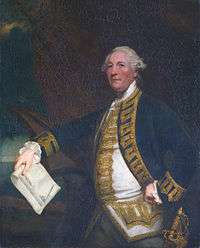Sir William James, 1st Baronet
Commodore Sir William James, 1st Baronet, FRS (c.1721 – 16 December 1783) was a Welsh-born commander of the East India Company navy, director of the Company and politician who sat in the House of Commons from 1774 to 1783. He conducted successful campaigns against the navies of Indian territories.

Early life
The son of an impoverished miller from Haverfordwest, Pembrokeshire, James ran away to sea in 1732, and by 1738 was commanding his own ship and serving in the West Indies. In 1747, he joined the East India Company and was appointed commodore of its Bombay Marine naval forces four years later.
Naval career
James is particularly associated with an action on 2 April 1755 when, commanding the Bombay Marine Ship Protector he attacked and destroyed the fortress of Tulaji Angre (also spelt Tollagee Angria; son of Kanhoji Angre, described by English revisionists as a "pirate", by local revisionists as the "admiral" of the Maratha Empire navy), at Severndroog (an English representation of the latter part of Janjeera Soowumdroog or Suvarnadurg), in Konkan, along the western coast of India, between Mumbai and Goa. He had initially been instructed only to blockade the stronghold, but through his intimate knowledge of the rocky coastline was able to get close enough to blow up the fortress. Although the East India Company had spent considerable sums providing protection from piracy, he only received £100 in reward.
In February 1756, he supported the capture of Gheriah (now Vijaydurg) by Colonel Robert Clive and Admiral Charles Watson, and was active in numerous skirmishes against the French, helping to consolidate the British position in India.
Later life
James returned to England in 1759, settling in Eltham in north-west Kent. In 1765, he married his second wife, Anne Goddard, with whom he had two children: Edward and Elizabeth.[1] He became a Director of the East India Company in 1768 was reappointed in most years until his death in 1783. He was frequently deputy chairman and was chairman of the directors in 1779. He was a governor of Greenwich Hospital and a fellow of the Royal Society for his contribution to navigation.[2] In 1778 he was created baronet.
James became an associate of Lord Sandwich and through him became involved in politics. In 1770 he stood for Parliament at Shoreham, but was defeated overwhelmingly. At the 1774 general election he was returned unopposed at West Looe on the Buller interest. He was returned again unopposed for West Looe at the 1780 general election by John Buller, with whom he also stood unsuccessfully at Saltash. As an associate of Sandwich he supported Lord North until his fall from power in 1782. James came under personal attack when a report from the select committee on Bengal affairs was put before the House on 1 April 1783. This alleged that James and Laurence Sulivan had altered the records of the East India Company and tried to deceive the committee about communications with India. James maintained that the charges were false and opposed any publication of the report without a defence.[3]
James died of a stroke at his daughter Elizabeth Anne's wedding to Thomas Parkyns, 1st Baron Rancliffe MP on 16 December 1783.[4] He was buried at Eltham and the following year a folly, Severndroog Castle (designed by East India Company architect Richard Jupp), was built as a memorial to him by his wife, Lady James of Eltham, on nearby Shooter's Hill. His title passed to his son Edward William and became extinct on the latter's own death.[5]
References
- "Who was Lady James?". Severndroog Castle.
- http://www2.royalsociety.org/DServe/dserve.exe?dsqIni=Dserve.ini&dsqApp=Archive&dsqCmd=Show.tcl&dsqDb=Persons&dsqSearch=%28Surname=%27james%27%29&dsqPos=30%5B%5D
- "JAMES, William (?1721-83), of Park Farm Place, Eltham, Kent". History of Parliament Online. Retrieved 29 December 2017.
- "PARKYNS, Thomas Boothby (1755-1800), of Rookley, Hants". History of Parliament Online. Retrieved 2 July 2014.
- http://www.leighrayment.com/baronetage/baronetsJ.htm
Leigh Rayment's list of baronets
| Parliament of Great Britain | ||
|---|---|---|
| Preceded by James Townsend William Graves |
Member of Parliament for West Looe 1774–1783 With: Charles Ogilvie 1774–1775 John Rogers 1775–1780 John Buller 1780–1782 John Somers Cocks 1782–1783 |
Succeeded by John Somers Cocks John Buller |
| Baronetage of Great Britain | ||
| New title | Baronet (of Eltham, Kent) 1778–1783 |
Succeeded by Edward William James |